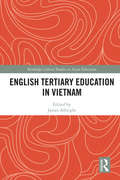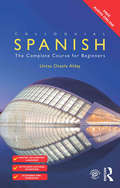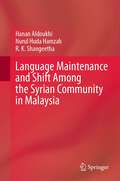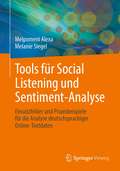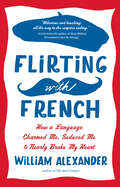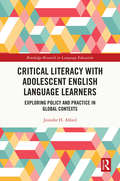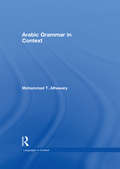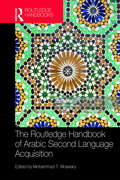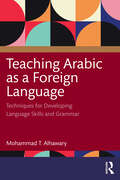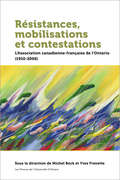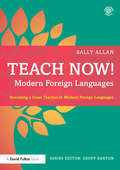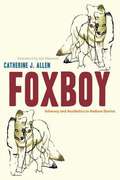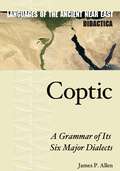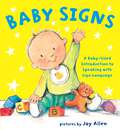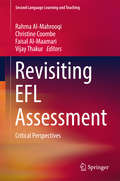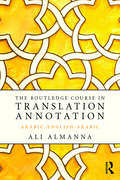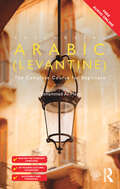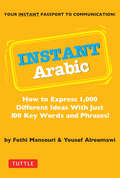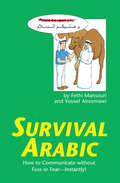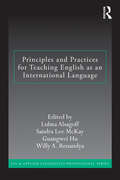- Table View
- List View
English Tertiary Education in Vietnam (Routledge Critical Studies in Asian Education)
by James AlbrightAs part of a long series of Vietnam’s policy objectives, English education has been identified as key to improving the quality of its rapidly expanding tertiary institutions and is crucial to the larger aim of modernising and internationalising its economy. Bringing together a wide range of Vietnamese and foreign English education scholars, and tertiary educational practitioners, this book documents the significant progress and challenges in the realisation of Vietnam’s English language policies as they are enacted in the higher education sector. Changes to Vietnam’s higher education system remain unstable, unsystematic, and insubstantial. This book provides insights into how recent Vietnamese government policy is providing for a substantial and comprehensive renewal of Vietnam’s tertiary education as part of their 2020 plan. Academics and students of English education, language policy, and nation building within the context of increased globalisation and marketisation in developing nations and Vietnam, in particular, should find this book valuable.
Colloquial Spanish: The Complete Course for Beginners (The\colloquial Ser.)
by Untza Otaola AldayColloquial Spanish: The Complete Course for Beginners has been carefully developed by an experienced teacher to provide a step-by-step course to Spanish as it is written and spoken today. Combining a clear, practical and accessible style with a methodical and thorough treatment of the language, it equips learners with the essential skills needed to communicate confidently and effectively in Spanish in a broad range of situations. No prior knowledge of the language is required. Colloquial Spanish is exceptional; each unit presents a wealth of grammatical points that are reinforced with a wide range of exercises for regular practice. A full answer key, a grammar summary, bilingual glossaries and English translations of dialogues can be found at the back as well as useful vocabulary lists throughout. Key features include: A clear, user-friendly format designed to help learners progressively build up their speaking, listening, reading and writing skills Jargon-free, succinct and clearly structured explanations of grammar An extensive range of focused and dynamic supportive exercises Realistic and entertaining dialogues covering a broad variety of narrative situations Helpful cultural points explaining the customs and features of life in Spain An overview of the sounds of Spanish Balanced, comprehensive and rewarding, Colloquial Spanish is an indispensable resource both for independent learners and students taking courses in Spanish. Audio material to accompany the course is available to download free in MP3 format from www.routledge.com/cw/colloquials. Recorded by native speakers, the audio material features the dialogues and texts from the book and will help develop your listening and pronunciation skills.
Language Maintenance and Shift Among the Syrian Community in Malaysia
by Hanan Aldoukhi Nurul Huda Hamzah R. K. ShangeethaThis book investigates language choices in different domains among Syrian Arab Muslim families who came to Malaysia after war broke out in their country. It focuses on how Syrian Heritage Language (HL), Modern Standard Arabic (MSA), Classical Arabic (CA), and other languages that might be spoken by these families were maintained and/or shifted from the time these families came to Malaysia until the lockdown due to the COVID-19 pandemic. Most works on Syrian community in Malaysia are focused on social and humanitarian issues; none has explored how Syrians in Malaysia are managing their language use in connection with day-to-day communication and integration. As the Syrian community in Malaysia adapts by learning the host language, their mother language/s might experience a shift. The way the minority communities view their mother language by prioritizing or deprioritizing its use in the family milieu are factors that contribute to language maintenance and language shift (LMLS). As such, this book provides insights on how Syrian parents are managing their own and their children’s language/s, along with the language of the host country.
Tools für Social Listening und Sentiment-Analyse: Einsatzfelder und Praxisbeispiele für die Analyse deutschsprachiger Online-Textdaten
by Melpomeni Alexa Melanie SiegelMit diesem Buch lernen Sie, wie Sie Social Listening und Sentiment-Analyse professionell einsetzen können. Der Leser erhält Schritt-für-Schritt-Beschreibungen für verschiedene Einsatzszenarien, gekoppelt mit Übungsaufgaben und nützlichen Materialien, darunter ein Merkblatt für Kennzahlen, eine Checkliste für die Toolauswahl und ein Glossar für Fachbegriffe. Dieses Lehr- und Praxisbuch verdeutlicht anhand von Anwendungsszenarien und Praxisbeispielen, wie Tools und Technologien für Social Listening und Sentiment-Analyse für die Analyse deutschsprachiger Online-Textdaten angewandt werden können und welche Vorteile diese bringen. Der Leser erhält einen Überblick über wichtige Funktionalitäten aktuell verfügbarer Social-Listening-Tools und deren Einsatzmöglichkeiten.
Flirting with French: How a Language Charmed Me, Seduced Me, and Nearly Broke My Heart
by William Alexander“A delightful and courageous tale and a romping good read. Voila!” —Mark Greenside, author of I’ll Never Be French (No Matter What I Do) William Alexander is more than a Francophile. He wants to be French. There’s one small obstacle though: he doesn’t speak la langue française. In Flirting with French, Alexander sets out to conquer the language he loves. But will it love him back? Alexander eats, breathes, and sleeps French (even conjugating in his dreams). He travels to France, where mistranslations send him bicycling off in all sorts of wrong directions, and he nearly drowns in an immersion class in Provence, where, faced with the riddle of masculine breasts, feminine beards, and a turkey cutlet of uncertain gender, he starts to wonder whether he should’ve taken up golf instead of French. While playing hooky from grammar lessons and memory techniques, Alexander reports on the riotous workings of the Académie française, the four-hundred-year-old institution charged with keeping the language pure; explores the science of human communication, learning why it’s harder for fifty-year-olds to learn a second language than it is for five-year-olds; and, frustrated with his progress, explores an IBM research lab, where he trades barbs with a futuristic hand-held translator. Does he succeed in becoming fluent? Readers will be as surprised as Alexander is to discover that, in a fascinating twist, studying French may have had a far greater impact on his life than actually learning to speak it ever would. “A blend of passion and neuroscience, this literary love affair offers surprise insights into the human brain and the benefits of learning a second language. Reading William Alexander’s book is akin to having an MRI of the soul.” —Laura Shaine Cunningham, author of Sleeping Arrangements “Alexander proves that learning a new language is an adventure of its own--with all the unexpected obstacles, surprising breakthroughs and moments of sublime pleasure traveling brings.” —Julie Barlow, author of Sixty Million Frenchmen Can’t Be Wrong
Critical Literacy with Adolescent English Language Learners: Exploring Policy and Practice in Global Contexts (Routledge Research in Language Education)
by Jennifer AlfordThis book examines critical literacy within language and literacy learning, with a particular focus on English as an Additional Language learners in schools who traditionally are not given the same exposure to critical literacy as native-English speakers. An important and innovative addition to extant literature, this book explains how English language teachers understand critical literacy and enact it in classrooms with adolescent English language learners from highly diverse language backgrounds. This book brings together the study of two intersecting phenomena: how critical literacy is constructed in English language education policy for adolescent English language learners internationally and how critical literacy is understood and enacted by teachers amid the so-called ‘literacy crisis’ in neoliberal eduscapes. The work traces the ways critical literacy has been represented in English language education policy for adolescents in five contexts: Australia, England, Sweden, Canada and the United States. Drawing on case study research, it provides a comparative analysis of how policy in these countries constructs critical literacy, and how this then positions critical engagement as a focus for teachers of English language learners. Empirically based and accessibly written, this timely book will be of interest to a wide range of academics in the fields of adolescent literacy education, English language learning and teaching, education policy analysis, and critical discourse studies. It will also appeal to teachers, post-graduate students and language education policy makers.
Arabic Grammar in Context (Languages in Context)
by Mohammad AlhawaryArabic Grammar in Context offers a unique and exciting approach to learning grammar. It presents grammar as a necessary and essential tool for understanding Arabic and for developing comprehension and production skills. Features include: authentic texts from a rich variety of sources, literary and non-literary, used as the starting point for the illustration and explanation of key areas of Arabic grammar clear and authoritative demonstration of the relevance of grammar for understanding and interpreting Arabic a wide range of appropriate exercises designed to consolidate learning fully vocalized exercises and texts a glossary of vocabulary and expressions provided at the end of the book audio readings of the texts available online for additional listening practice. Suitable for class use and independent study, Arabic Grammar in Context is ideal for intermediate to advanced learners of Arabic.
Routledge Handbook of Arabic Second Language Acquisition (Routledge Language Handbooks)
by Mohammad T. AlhawaryThe Routledge Handbook of Arabic Second Language Acquisition introduces major current approaches in Arabic second language acquisition (SLA) research and offers empirical findings on crucial aspects and issues to do with the learning of Arabic as a foreign language and Arabic SLA. It brings together leading academics in the field to synthesize existing research and develops a new framework for analyzing important topics within Arabic SLA. This handbook will be suitable as a reference work for advanced undergraduate and postgraduate students and scholars actively researching in this area and is primarily relevant to sister disciplines within teacher training and Arabic applied linguistics. The themes and findings should, however, also be attractive to other areas of study, including theoretical linguistics, psycholinguistics, cognition, and cognitive psychology.
Teaching Arabic as a Foreign Language: Techniques for Developing Language Skills and Grammar
by Mohammad T. AlhawaryTeaching Arabic as a Foreign Language: Techniques for Developing Language Skills and Grammar is an indispensable guide for in-training and novice teachers of Arabic as a foreign language and a source of fresh and effective ideas for experienced teachers. This highly practical guide outlines how Arabic second-language skills (listening, speaking, reading, and writing) and grammar are targeted in isolation from one another and how they are integrated to reinforce each other through the use of specific tried-and-tested techniques and activities. Teaching Arabic as a Foreign Language provides instantly accessible, practical teaching techniques to target and develop specific language skills and grammar at novice, intermediate, and advanced levels.
Romance Languages
by Ti Alkire Carol RosenTi Alkire and Carol Rosen trace the changes that led from colloquial Latin to five major Romance languages, those which ultimately became national or transnational languages: Spanish, French, Italian, Portuguese, and Romanian. Trends in spoken Latin altered or dismantled older categories in phonology and morphology, while the regional varieties of speech, evolving under diverse influences, formed new grammatical patterns, each creating its own internal regularities. Documentary sources for spoken Latin show the beginnings of this process, which comes to full fruition in the medieval emergence of written Romance languages. This book newly distills the facts into an appealing program of study, including exercises, and makes the difficult issues clear, taking well motivated and sometimes innovative stands. It provides not only an essential guide for those new to the topic, but also a reliable compendium for the specialist.
Résistances, mobilisations et contestations: L’Association canadienne-française de l’Ontario (1910-2006) (Collection Amérique française)
by Gratien Allaire Serge Dupuis Mariève Forest Anne Gilbert Marcel MartelL’Association canadienne-française de l’Ontario (ACFO) a été le principal porte-parole politique de la collectivité franco-ontarienne au XXe siècle. Cette analyse historique en six chapitres chronologiques va de la fondation de l’Association canadienne-française d’éducation d’Ontario (ACFEO) en 1910 jusqu’à sa disparition et son absorption par l’Assemblée de la francophonie de l’Ontario en 2006. De 1910 à 1927, l’Association joue un rôle déterminant dans la crise du Règlement 17, qui interdit l’enseignement en français dans les écoles de la province. De 1927-1969, l’ACFEO contribue activement à l’avancement de la cause des écoles françaises (ou « bilingues ») de l’Ontario. Entre 1969 et 1982, l’Association, devenue l’« ACFO », travaille aux progrès institutionnels de la collectivité franco-ontarienne, tout en essuyant des critiques, voire des dénonciations formulées par plusieurs groupes de militants animés par les idéologies contre-culturelle et participative alors en vogue. Entre 1982 et 1992, l’ACFO se redéfinit pour s’adapter à la transformation de l’espace politique de l’Ontario français, ainsi qu’à la fragmentation de son champ idéologique sous l’impulsion de plus en plus irrépressible des régionalismes identitaires et de l’arrivée de groupes ethnoculturels issus de l’immigration francophone. Les années 1992-2006 sont les dernières de l’ACFO, qui ne peut se relever de la crise de légitimité qui la mine depuis la fin des années 1970. Une fenêtre privilégiée sur les efforts de construction identitaire et politique de la francophonie ontarienne au XXe siècle. Ce livre est publié en français. - The French-Canadian Association of Ontario (ACFO) has been the main political voice person for the Franco-Ontarian community in the 20th century. The first chapter (1910-1927) examines the first years of the Association and delves into the pivotal role it played during the debate surrounding Regulation 17, which was designed to prevent French-language schooling in the province. From 1927-1969, the ACFEO actively contributed to the advancement of French (or “bilingual”) schools in Ontario. From 1969-1982, the Association, now called ACFO, played a key role in the institutional progress of the Franco-Ontarian community, amidst much criticism and accusations made by militants inspired by the counter-culture and participative ideologies of the day. From 1982 to 1992, ACFO redefined itself in order to adapt to an evolving political situation in l’Ontario français, as well as to the fragmentation of its ideology as regional identities took shape to a new ethnocultural reality in the wake of francophone immigration. The years from 1992 to 2006 were the Association’s last, as it became unable to overcome a legitimacy crisis that had been undermining it since the end of the 1970s. A glimpse into the efforts that went into the identity and political construct of the Ontarian Francophonie throughout the 20th century. This book is published in French.
Teach Now! Modern Foreign Languages: Becoming a Great Teacher of Modern Foreign Languages (Teach Now!)
by Sally AllanBeing taught by a great teacher is one of the great privileges of life. Teach Now! is an exciting new series that opens up the secrets of great teachers and, step-by-step, helps trainees to build the skills and confidence they need to become first-rate classroom practitioners. Written by a highly-skilled practitioner, this practical, classroom-focused guide contains all the support you need to become a great modern foreign languages teacher. Combining a grounded, modern rationale for learning and teaching with highly practical training approaches, the book guides you through all the different aspects of MFL teaching offering clear, straightforward advice on classroom practice, lesson planning and working in schools. Teaching and learning, planning, assessment and behaviour management are all covered in detail, with a host of carefully chosen examples used to demonstrate good practice. There are also chapters on the essentials of the MFL curriculum, pedagogical techniques, strategies to engage students in language learning, and how to succeed in observations and interviews. Throughout the book, there is a great selection of ready-to-use activities, approaches and techniques which will help put you on the fast track to success in the classroom. Covering everything you need to know, this book is your essential guide as you start your exciting and rewarding career as an outstanding MFL teacher.
Foxboy
by Catherine J. AllenOnce there was a Quechua folktale. It begins with a trickster fox’s penis with a will of its own and ends with a daughter returning to parents who cannot recognize her until she recounts the uncanny adventures that have befallen her since she ran away from home. Following the strange twists and turnings of this tale, Catherine J. Allen weaves a narrative of Quechua storytelling and story listening that links these arts to others—fabric weaving, in particular—and thereby illuminates enduring Andean strategies for communicating deeply felt cultural values. In this masterful work of literary nonfiction, Allen draws out the connections between two prominent markers of ethnic identity in Andean nations—indigenous language and woven cloth—and makes a convincing case that the connection between language and cloth affects virtually all aspects of expressive culture, including the performing arts. As she explores how a skilled storyteller interweaves traditional tales and stock characters into new stories, just as a skilled weaver combines traditional motifs and colors into new patterns, she demonstrates how Andean storytelling and weaving both embody the same kinds of relationships, the same ideas about how opposites should meet up with each other. By identifying these pervasive patterns, Allen opens up the Quechua cultural world that unites story tellers and listeners, as listeners hear echoes and traces of other stories, layering over each other in a kind of aural palimpsest.
The Ancient Egyptian Language
by James P. AllenThis book, the first of its kind, examines how the phonology and grammar of the ancient Egyptian language changed over more than three thousand years of its history, from the first appearance of written documents, c. 3250 BC, to the Coptic dialects of the second century AD and later. Part One discusses phonology, working backward from the vowels and consonants of Coptic to those that can be deduced for earlier stages of the language. Part Two is devoted to grammar, including both basic components such as nouns and the complex history of the verbal system. The book thus provides both a synchronic description of the five major historical stages of ancient Egyptian and a diachronic analysis of their development and relationship.
Coptic: A Grammar of Its Six Major Dialects (Languages of the Ancient Near East Didactica #1)
by James P. AllenCoptic is the final stage of the ancient Egyptian language, written in an alphabet derived primarily from Greek instead of hieroglyphs. It borrows some vocabulary from ancient Greek, and it was used primarily for writing Christian scriptures and treatises. There is no uniform Coptic language, but rather six major dialects.Unlike previous grammars that focus on just two of the Coptic dialects, this volume, written by senior Egyptologist James P. Allen, describes the grammar of the language in each of the six major dialects. It also includes exercises with an answer key, a chrestomathy, and an accompanying dictionary, making it suitable for teaching or self-guided learning as well as general reference.
Coptic: A Grammar of Its Six Major Dialects (Languages of the Ancient Near East Didactica)
by James P. AllenCoptic is the final stage of the ancient Egyptian language, written in an alphabet derived primarily from Greek instead of hieroglyphs. It borrows some vocabulary from ancient Greek, and it was used primarily for writing Christian scriptures and treatises. There is no uniform Coptic language, but rather six major dialects.Unlike previous grammars that focus on just two of the Coptic dialects, this volume, written by senior Egyptologist James P. Allen, describes the grammar of the language in each of the six major dialects. It also includes exercises with an answer key, a chrestomathy, and an accompanying dictionary, making it suitable for teaching or self-guided learning as well as general reference.
Baby Signs: A Baby-Sized Introduction to Speaking with Sign Language
by Joy AllenLong before they're able to talk, babies have a whole lot to say! Widen their world with this delightful modern classic—a must-have for growing families and a perfect baby shower or new-baby gift. With this adorable board book of essential signs, babies and toddlers can easily learn how to communicate their needs, wants, and feelings and even make basic observations with a simple gesture. Studies show that babies who use sign language feel less frustrated, throw fewer tantrums, and often learn to talk more easily. Just point to a sign in the book, say the word while making the sign, and the baby will soon be signing. Communicating a wet diaper or a hungry belly, asking for help or saying "all done" becomes as easy as waving hello or good-bye. And these are just a few of the thirteen signs inside this small and adorably illustrated board book, perfect for little hands and minds to grasp.
Vox Latina
by W. Sidney AllenThis is a reissue in paperback of the second edition of Professor Allen's highly successful book on the pronunciation of Latin in Rome in the Golden Age. In the second edition the text of the first edition is reprinted virtually unchanged but is followed by a section of supplementary notes that deal with subsequent developments in the subject. The author also added an appendix on the names of the letters of the Latin alphabet and a select bibliography.
Revisiting EFL Assessment
by Rahma Al-Mahrooqi Christine Coombe Faisal Al-Maamari Vijay ThakurThis book examines acknowledged practices and demonstrates to teachers how to make the most out of their assessment practices. It also explores different assessment methods for skills such as reading, writing, listening and speaking. Forecasting the future of assessment and where concepts like alternative assessment and dynamic assessment are heading, it also shows how relatively new teaching methods such as communicative methodologies and problem-based learning are reflected in assessment. This book represents a forum where contributors have presented their research and innovative ideas and practices on the important topic of assessment and opened a fresh debate on it. It offers an excellent reference guide for EFL teachers, practitioners, researchers and testing and assessment specialists. Each chapter examines central issues inassessment and their connection with teaching and learning in EFL contexts.
The Routledge Course in Translation Annotation: Arabic-English-Arabic
by Ali AlmannaThe Routledge Course in Translation Annotation: Arabic-English-Arabic is a key coursebook for students and practitioners of translation studies. Focusing on one of the most prominent developments in translation studies, annotation for translation purposes, it provides the reader with the theoretical framework for annotating their own, or commenting on others', translations. The book: presents a systematic and thorough explanation of translation strategies, supported throughout by bi-directional examples from and into English features authentic materials taken from a wide range of sources, including literary, journalistic, religious, legal, technical and commercial texts brings the theory and practice of translation annotation together in an informed and comprehensive way includes practical exercises at the end of each chapter to consolidate learning and allow the reader to put the theory into practice culminates with a long annotated literary text, allowing the reader to have a clear vision on how to apply the theoretical elements in a cohesive way The Routledge Course in Translation Annotation is an essential text for both undergraduate and postgraduate students of Arabic-English translation and of translation studies.
Colloquial Arabic: The Complete Course for Beginners (Colloquial Series)
by Mohammad Al-MasriColloquial Arabic (Levantine) provides a step-by-step course in Levantine Arabic as it is used today. Combining a user-friendly approach with a thorough treatment of the language, it equips learners with the essential skills needed to communicate confidently and effectively in Levantine Arabic in a broad range of situations. No prior knowledge of the language is required. Key features include: progressive coverage of speaking, listening, reading and writing skills structured, jargon-free explanations of grammar an extensive range of focused and stimulating exercises realistic and entertaining dialogues covering a broad variety of scenarios useful vocabulary lists throughout the text additional resources available at the back of the book, including a full answer key and bilingual glossaries. Balanced, comprehensive and rewarding, Colloquial Arabic (Levantine) is an indispensable resource both for independent learners and students taking courses in Levantine Arabic. Colloquials are now supported by FREE AUDIO available online. All audio tracks referenced within the text are free to stream or download from www.routledge.com/cw/colloquials. Recorded by native speakers, the audio complements the book and will help enhance learners’ listening and speaking skills. By the end of this course, you will be at Level B1 of the Common European Framework for Languages and at the Intermediate-Low on the ACTFL proficiency scales.
Mi Mundo Estudios Sociales: La formación de nuestra nación
by Armando Cantú Alonzo Linda Bennett James B. KrachtNIMAC-sourced textbook
Instant Arabic
by Yousef Alreemawi Fethi MansouriIt's amazing how 100 key words and phrases provide instant communication!Do you want to speak simple Vietnamese but are too busy to study it? Are you visiting the Arabic-speaking world for a short time and want an Arabic phrase book to help you communicate? If so, this is the book for you. It includes all the essential content necessary to speak basic Arabic.The idea of Instant Arabic is simple-learn 100 words and phrases and say 1,000 things. The trick is knowing which 100 words to learn, but author Fethi Mansouri has solved the problem, choosing only those words you'll hear again and again. Even with a vocabulary this small, you'll be surprised how quickly and fluently you too can communicate in Arabic. The pronunciation for each Arabic word in the book follows a precise and simple formula that will quickly become so familiar that conversing in Arabic phrases and sentences soon feels just as 'normal' as speaking English. Here's a sample of what you'll be able to do:Meet peopleGo shoppingAsk directionsRide the subwayOrder food and drinksAnd much more
Survival Arabic: How to Communicate without Fuss or Fear - Instantly!
by Yousef Alreemawi Fethi MansouriA handy Arabic phrasebook and guide to the Arabic language, Survival Arabic contains basic vocabulary necessary for getting around.This book contains all the necessary words and phrases for speaking Arabic in any kind of setting.<P><P> Perfect for students, tourists, or business people learning Arabic or travelling to the Arab world, it also contains a beginner guide to the Arabic language, allowing for a deeper understanding of Arabic than a typical Arabic phrasebook or Arabic dictionary. The book is organized by situations where one might need to speak Arabic such as: at the hotel, in a taxi, using numbers, etc. All Arabic words and phrases are written in Romanized form as well as Authentic Arabic script (Naskh) so that in the case of difficulties the book can be shown to the person the user is trying to communicate with.This phrasebook includes:Hundreds of useful Arabic words and expressionsRomanized forms, phonetic spellings, and Arabic script (Naskh) for all words and phrasesAn introduction to the Arabic AlphabetA pronunciation guide for Arabic letters and wordsA guide to Arabic grammarA section on specific titles and place names
Principles and Practices for Teaching English as an International Language (ESL & Applied Linguistics Professional Series)
by Lubna Alsagoff Willy A. Renandya Guangwei Hu Sandra Lee McKayWhat general principles should inform a socioculturally sensitive pedagogy for teaching English as an International Language and what practices would be consistent with these principles? This text explores the pedagogical implications of the continuing spread of English and its role as an international language, highlighting the importance of socially sensitive pedagogy in contexts outside inner circle English-speaking countries. It provides comprehensive coverage of topics traditionally included in second language methodology courses (such as the teaching of oral skills and grammar), as well as newer fields (such as corpora in language teaching and multimodality); features balanced treatment of theory and practice; and encourages teachers to apply the pedagogical practices to their own classrooms and to reflect on the effects of such practices. Designed for pre-service and in-service teachers of English around the world, Principles and Practices for Teaching English as an International Language fills a critical need in the field.
